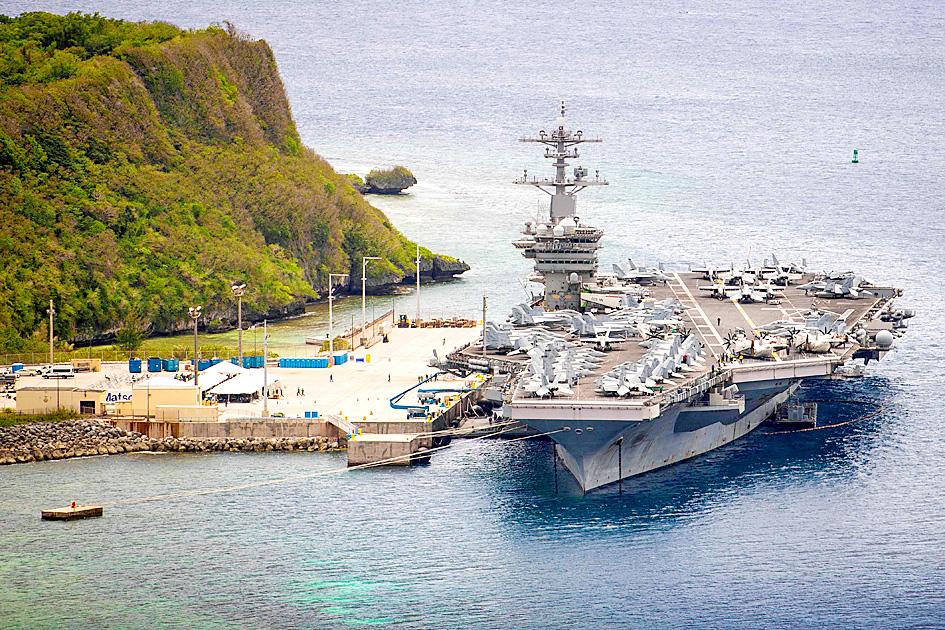The US military on Friday said that Chinese military flights in the past week in the South China Sea fit a pattern of destabilizing and aggressive behavior by Beijing, but posed no threat to a US Navy aircraft carrier strike group in the region.
“The Theodore Roosevelt Carrier Strike Group closely monitored all People’s Liberation Army Navy and Air Force activity, and at no time did they pose a threat to US Navy ships, aircraft, or sailors,” the US military’s Pacific Command said in a statement.
A US official, speaking on condition of anonymity, said the Chinese aircraft did not come within 250 nautical miles (463km) of the US Navy vessels.

Photo: AFP/US Navy/Conner D. Blake/Handout
Taiwan reported that several Chinese air force aircraft flew into the southwestern corner of its air defense identification zone last weekend, near the Taiwan-controlled Pratas Islands (Dongsha Islands, 東沙群島), including fighter jets and nuclear-capable H-6 bombers.
Regional security and diplomatic sources familiar with the situation said China’s air force was dispatched on missions beginning mid-morning on Saturday last week, coinciding with the US carrier group passing south of the Pratas Islands.
China, which has long geared its military toward defending itself against the US, was conducting exercises that would simulate an operation against an aircraft carrier, the sources said.
“They purposely conducted the drills when the US carrier was passing through the Bashi Channel,” one source said, referring to the waterway between southern Taiwan and the northern Philippines.
“That was not just meant for Taiwan. Most importantly, China is trying to tackle the issue of the South China Sea: It wants to stop the US military from entering the South China Sea. China wants to diminish the United States’ weight in the western Pacific,” the source said.
The sources spoke to reporters on condition of anonymity, as they were not authorized to speak to the media.
The Chinese Ministry of National Defense did not immediately respond to a request for comment.
On Thursday, the ministry toughened its language toward Taiwan, warning after last weekend’s stepped-up military activity near the nation that “independence means war,” and that its armed forces were acting in response to “provocation” and foreign interference.

INVESTIGATION: The case is the latest instance of a DPP figure being implicated in an espionage network accused of allegedly leaking information to Chinese intelligence Democratic Progressive Party (DPP) member Ho Jen-chieh (何仁傑) was detained and held incommunicado yesterday on suspicion of spying for China during his tenure as assistant to then-minister of foreign affairs Joseph Wu (吳釗燮). The Taipei District Prosecutors’ Office said Ho was implicated during its investigation into alleged spying activities by former Presidential Office consultant Wu Shang-yu (吳尚雨). Prosecutors said there is reason to believe Ho breached the National Security Act (國家安全法) by leaking classified Ministry of Foreign Affairs information to Chinese intelligence. Following interrogation, prosecutors petitioned the Taipei District Court to detain Ho, citing concerns over potential collusion or tampering of evidence. The

NEGOTIATIONS: Taiwan has good relations with Washington and the outlook for the negotiations looks promising, Minister of Economic Affairs J.W. Kuo said Taiwan’s GDP growth this year is expected to decrease by 0.43 to 1.61 percentage points due to the effects of US tariffs, National Development Council (NDC) Minister Paul Liu (劉鏡清) said at a meeting of the legislature’s Economics Committee in Taipei yesterday, citing a preliminary estimate by a private research institution. Taiwan’s economy would be significantly affected by the 32 percent “reciprocal” tariffs slapped by the US, which took effect yesterday, Liu said, adding that GDP growth could fall below 3 percent and potentially even dip below 2 percent to 1.53 percent this year. The council has commissioned another institution

TRADE: The premier pledged safeguards on ‘Made in Taiwan’ labeling, anti-dumping measures and stricter export controls to strengthen its position in trade talks Products labeled “made in Taiwan” must be genuinely made in Taiwan, Premier Cho Jung-tai (卓榮泰) said yesterday, vowing to enforce strict safeguards against “origin laundering” and initiate anti-dumping investigations to prevent China dumping its products in Taiwan. Cho made the remarks in a discussion session with representatives from industries in Kaohsiung. In response to the US government’s recent announcement of “reciprocal” tariffs on its trading partners, President William Lai (賴清德) and Cho last week began a series of consultations with industry leaders nationwide to gather feedback and address concerns. Taiwanese and US officials held a videoconference on Friday evening to discuss the

NEGOTIATIONS: The US response to the countermeasures and plans Taiwan presented has been positive, including boosting procurement and investment, the president said Taiwan is included in the first group for trade negotiations with the US, President William Lai (賴清德) said yesterday, as he seeks to shield Taiwanese exporters from a 32 percent tariff. In Washington, US Trade Representative Jamieson Greer said in an interview on Fox News on Thursday that he would speak to his Taiwanese and Israeli counterparts yesterday about tariffs after holding a long discussion with the Vietnamese earlier. US President Donald Trump on Wednesday postponed punishing levies on multiple trade partners, including Taiwan, for three months after trillions of US dollars were wiped off global markets. He has maintained a 10 percent